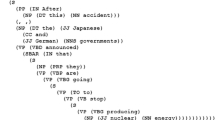Abstract
This research’s objective is to support learners in self-directed learning of history in an open learning space. Learners who request help are provided with a list of questions to orient them to new information. All the support is provided only on request and gives them multiple possibilities to give them more freedom in self-directed learning. The originality of our research is that the generated questions are content-dependent. To be able to generate such support, we had to overcome one major problem: the information in the open learning space needs to be understood by our system. The construction of this “semantic open learning space” permits the system to generate questions depending on the studied contents and the learner’s concept map.
Access this chapter
Tax calculation will be finalised at checkout
Purchases are for personal use only
Preview
Unable to display preview. Download preview PDF.
Similar content being viewed by others
References
Biswas, G., Roscoe, R., Jeong, H., Sulcer, B.: Promoting self-regulated learning skills in agent-based learning environments. In: Proceedings of the 17th International Conference on Computers in Education, pp. 67–74 (2009)
Bizer, C., Lehmann, J., Kobilarov, G., Auer, S., Becker, C., Cyganiak, R., Hellmann, S.: DBpedia-A crystallization point for the Web of Data. Web Semantics: Science, Services and Agents on the World Wide Web 7(3), 154–165 (2009)
Bollacker, K., Evans, C., Paritosh, P., Sturge, T., Taylor, J.: Freebase: A collaboratively created graph database for structuring human knowledge. In: Proceedings of the 2008 ACM SIGMOD International Conference on Management of Data, pp. 1247–1250 (June 2008)
Bransford, J.D., Brown, A., Cocking, R.: How people learn: Mind, brain, experience, and school. National Research Council, Washington, DC (1999)
Graesser, A., Ozuru, Y., Sullins, J.: What is a good question? In: Bringing reading research to life. Guilford Press (2010)
Heilman, M., Smith, N.A.: Extracting simplified statements for factual question generation. In: Proceedings of QG 2010: The Third Workshop on Question Generation, p. 11 (June 2010)
Hirashima, T., Yamasaki, K., Fukuda, H., Funaoi, H.: Kit-build concept map for automatic diagnosis. In: Biswas, G., Bull, S., Kay, J., Mitrovic, A. (eds.) AIED 2011. LNCS, vol. 6738, pp. 466–468. Springer, Heidelberg (2011)
Husbands, C.: What is history teaching?: Language, ideas and meaning in learning about the past. Open University Press, Berkshire (1996)
Kashihara, A., Taira, K.: Developing Navigation Planning Skill with Learner-Adaptable Scaffolding. In: Proceedings of the 2009 Conference on Artificial Intelligence in Education: Building Learning Systems that Care: From Knowledge Representation to Affective Modelling, pp. 433–440. IOS Press (July 2009)
Leelawong, K., Biswas, G.: Designing learning by teaching agents: The Betty’s Brain system. International Journal of Artificial Intelligence in Education 18(3), 181–208 (2008)
Mostow, J., Jang, H.: Generating diagnostic multiple choice comprehension cloze questions. In: Proceedings of the Seventh Workshop on Building Educational Applications Using NLP, pp. 136–146. Association for Computational Linguistics (June 2012)
Otero, J.: Question generation and anomaly detection in texts. In: Handbook of Metacognition in Education, pp. 47–59 (2009)
Riley, M.: Into the Key Stage 3 history garden: Choosing and planting your enquiry questions. In: Teaching History. Historical Association, London (2000)
Smart, L.: Using I.T. in primary school history. Cassell, London (1996)
Stow, W., Haydn, T.: 7 Issues in the teaching of chronology. Issues in History Teaching 83 (2000)
Author information
Authors and Affiliations
Editor information
Editors and Affiliations
Rights and permissions
Copyright information
© 2014 Springer International Publishing Switzerland
About this paper
Cite this paper
Jouault, C., Seta, K. (2014). Content-Dependent Question Generation for History Learning in Semantic Open Learning Space. In: Trausan-Matu, S., Boyer, K.E., Crosby, M., Panourgia, K. (eds) Intelligent Tutoring Systems. ITS 2014. Lecture Notes in Computer Science, vol 8474. Springer, Cham. https://doi.org/10.1007/978-3-319-07221-0_37
Download citation
DOI: https://doi.org/10.1007/978-3-319-07221-0_37
Publisher Name: Springer, Cham
Print ISBN: 978-3-319-07220-3
Online ISBN: 978-3-319-07221-0
eBook Packages: Computer ScienceComputer Science (R0)




